Must-know Winter Allergy Tips to Fight Against UNPLEASANT Symptoms
- Can I Have Allergies in the Winter?
- Top Winter Allergy Tips
- Identify the allergens
- Clean your house
- Minimize your exposure to allergy triggers
- Reduce pet allergy triggers
- Protect your bedding
- Keep humidity in check
- Keep indoor air clean
- Visit an allergist
- Common Winter Allergy Symptoms
- Winter Allergies vs a Cold
Even if cold temperatures alleviate seasonal pollen allergies, millions of people suffer from winter allergies due to the time spent indoors during cool weather. You don't have to accept indoor allergies as a natural part of the winter season. By following these winter allergy tips, you can be proactive in combating irritating symptoms.
.jpg)
Top winter allergy remedies
Can I Have Allergies in the Winter?
Yes, you can have allergies in the winter – one of the unpleasant winter season diseases. Winter allergy season generally begins in late fall and can last through early spring, depending on the region and climate.
While many people think of allergies as a warm-weather problem, they can occur year-round, including during the colder months.
Recognizing the timing of your symptoms and their recurrence during the same season each year may help identify whether they are related to winter allergies.
Top Winter Allergy Tips
There are many ways when it comes to how to deal with common winter allergies. Taking a few easy steps will help you control your allergy symptoms over the winter.
Identify the allergens
The first step in dealing with allergies winter time is to determine what is causing them. Once you've identified your allergies, you may make efforts to limit your exposure to them.
The following are some common winter allergy triggers:
.jpg)
What causes bad winter allergies?
Clean your house
Cleaning your house is among the easiest methods. Dust, pet dander, mold, dust mites, and cockroach droppings may lurk anywhere and cause coughing, sneezing, and congestion.
For this reason, maintain a consistent cleaning schedule to reduce your exposure to indoor allergens. Dust and vacuum often, particularly under and behind furniture, where allergies may quickly accumulate.
Moreover, you should wipe down frequently used surfaces such as countertops.
During the holidays, clean out Christmas decorations, especially if they are stored in places where dust and mold proliferate.
Minimize your exposure to allergy triggers
One of the best winter allergy tips is to decrease your exposure to the items that cause your allergy symptoms:
.jpg)
Best allergy tips and tricks
-
Stay indoors on windy, dry days. The ideal time to go outside is after a good rain, as it helps remove pollen from the air.
-
Don’t mow the lawn, pull weeds, or do other gardening tasks that may stir up allergens.
-
Take off clothes that you have worn outside and shower to rinse pollen from your hair and skin.
-
Avoid hanging laundry outside since pollen may stick to sheets and towels.
-
Wear a face mask while doing outside chores.
Reduce pet allergy triggers
Although you may like snuggling with your cat or dog before bed, keeping them out of the bedroom may assist with nighttime allergies that can interrupt your sleep.
Keep your bedroom door locked during the day so that your furry family members are not enticed to enter.
.jpg)
Minimize pet allergy triggers
When caressing your pets, wash your hands afterward to prevent accidentally touching your face and causing an allergic reaction. Groom your pets on a regular basis to help minimize indoor air allergies.
Protect your bedding
Dust mites grow in warm, humid environments and are commonly found in mattresses, pillows, carpets, and upholstered furniture. Even if your home seems to be clean, these particles are too tiny to notice.
To reduce your exposure to dust mites, you should use mite-proof zippered coverings for your mattress and pillows.
To remove any remaining dust mite droppings, wash and replace your blankets, sheets, and other bedding in hot water once a week.
Keep humidity in check
.jpg)
Check humidity frequently
Winter may appear to be a drier season than typical due to the furnace running continuously.
However, mold may grow in wet environments such as your basement. Dust mites may also "drink" by absorbing moisture, which is why they are most common in humid environments.
To prevent mold growth and dust mite infestation, your house should have a relative humidity of less than 50%. Furnaces, dehumidifiers, and ceiling fans circulate air, helping keep the house dry.
Keep indoor air clean
Another useful tip for coping with an allergy winter is to keep your home well-ventilated, especially when you are indoors more than usual.
The reason is that, because of the colder weather, you are most likely keeping doors and windows closed to keep the cold out.
.jpg)
Use air conditioning in your house
By doing so, you are also bringing allergens with you, and your heating system will recirculate the indoor air and any allergy triggers.
Here are some suggestions to get rid of allergens from the air in your house and avoid other health problems in cold weather:
-
Use air conditioning in your house
-
Properly filter the air in your house and change the furnace filter regularly
-
Use a dehumidifier to keep indoor air dry
-
Clean the floor frequently using a vacuum clean with a high-efficiency particulate air (HEPA) filter
-
Use a portable HEPA filter in your bedroom
Visit an allergist
Allergists are the most well-trained medical specialists in treating allergies and asthma. They can help you get tested, treated, and feel well so you can enjoy the holidays and beyond.
.jpg)
Ask an allergist for advice
Following a consultation, an allergist may do tests to diagnose your allergies and determine probable reasons. Also, they can prescribe antihistamines and other allergy medicines to help you manage your allergic symptoms.
If you are interested in this topic, head over to our guide on summer allergy tips to find out more!
Common Winter Allergy Symptoms
If you have seasonal allergies, you will recognize the symptoms of winter allergies. According to the Asthma and Allergy Foundation of America, the following are some frequent symptoms:
.jpg)
Common winter allergy symptoms
Winter Allergies vs a Cold
Winter allergies and colds share similar symptoms.
However, colds are caused by viruses and transmitted through contact with another person who has them. Allergies, on the other hand, are caused by an allergen or irritant that causes a histamine reaction.
Timing is also a hint. Colds often last a few days or a week, ending as your body fights the infection. Allergies remain much longer since they continue as long as the allergen is there.
Final Words
Many people believe that allergies are seasonal and caused by tree, grass, and ragweed pollen. Surprisingly, seasonal allergies can strike almost any time of year. If you live in a warm environment, you may encounter allergies in the winter. But don't panic; the winter allergy tips mentioned earlier will help you deal with your indoor allergies. Follow them, and let's stay healthy!

![10 Proven Tips to Stay Warm in Cold Weather [Winter Safety Guide]](https://admin.goweatherforecast.com/images/1733294342.png)









0 Comments
Leave a Comment
Your email address will not be published. Required fields are marked *